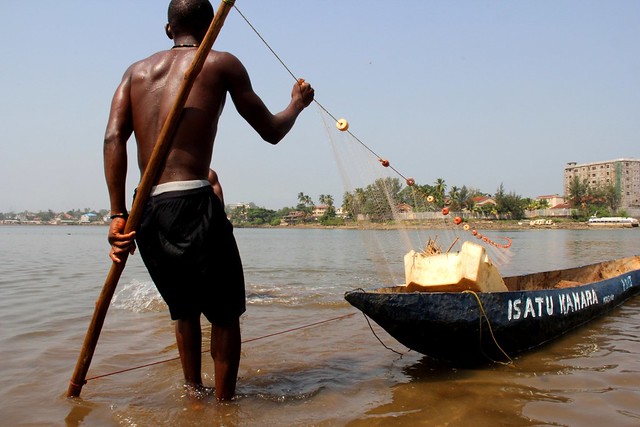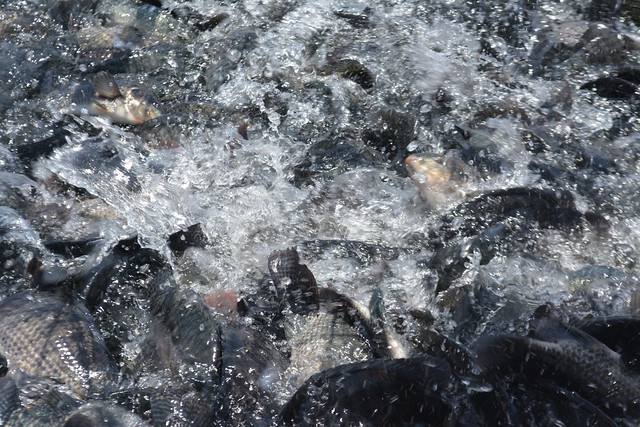Oceans in Crisis as they Absorb the Brunt of Climate Change

NAIROBI, Sep 26 (IPS) - Warnings of strong winds, high waves and reduced visibility along the East African coastline are increasingly common.
But local fisher folk like Ali Sombo from Kwale County, situated along Kenya's Indian Ocean Coastline, don't always heed the warnings by the Kenya Meteorological Department (KMD) to stay clear of the open sea during rough waters.
"We believe that when the waters are rough and waves roaring, the belly of the ocean is hunting for a specific soul. Even if you stay away from the ocean, it will find you so there is no need to be afraid," Sombo told IPS. "Our only problem is that most of our boats are not strong enough for the strong waves so they capsize and sometimes fishermen die," he added.
In July, KMD warned, through local radio, of five days of unprecedented rough waters characterised by strong winds of 25 miles per hour and high waves of more than three metres. But Sombo and his group of fishermen said that it was still business as usual for them.
But coastal communities here in Africa and across the globe are increasingly at risk to being "exposed to multiple climate-related hazards, including tropical cyclones, extreme sea levels and flooding, marine heatwaves, sea ice loss, and permafrost thaw".
These are some of the findings in the newly released Special Report on the Ocean and Cryosphere in a Changing Climate (SROCC) by the United Nation's Intergovernmental Panel on Climate Change (IPCC) on Sept. 25, in Monaco.
The oceans are being rapidly transformed by climate change. Millions, and by 2050 over a billion people, living along the coast are most at risk, with additional "negative consequences for health and well-being" for all populations and "for Indigenous peoples and local communities dependent on fisheries".
In Africa some 25 percent of the population lives within 100km of the coast — with the figure as high as 66 percent in Senegal, according to the United Nations Development Programme.
And according to the report:
- Around 4 million people live in the Arctic region, of whom 10 percent are Indigenous.
- The low-lying coastal zone is currently home to around 680 million people (nearly 10 percent of the 2010 global population), projected to reach more than one billion by 2050.
- Small Island Developing States (SIDS) are home to 65 million people.
For this report, more than 100 authors from 36 countries assessed the most recent scientific literature related to the oceans and cryosphere (frozen parts of the planet such as the ice caps, glaciers and snow) in a changing climate. Oceans are critical to "regulating the planet's climate and weather patterns through the cycling of critical greenhouse gases such as CO₂".
The oceans and cryosphere are interconnected, with evaporation from the oceans resulting in snow that "builds and sustains the ice sheets and glaciers that store large amounts of frozen water on land", the report explains.
Making reference to an estimated 7,000 scientific publications, the outcome is the most detailed insight yet into how global warming will impact the future.
U.N. scientists now warn that consequences of inaction will become increasingly rapid and painful over this century and that immediate emission cuts could greatly reduce these risks.
The report reveals that to date, the oceans, which cover more than 71 percent of the earth, has taken up more than 90 percent of the excess heat in the climate system. It also notes that glaciers and ice sheets in polar and mountain regions are losing mass, contributing to an increasing rate of sea level rise.
It further predicts that by the end of this century the oceans will absorb up to two to four times more heat than between 1970 and the present if global warming is limited to 2°C, and up to five to seven times more at higher carbon emissions.
Last October the IPCC released a significant report on global warming, called Special Report on Global Warming of 1.5 °C, known as SR15, which projected that extreme weather events will only get worse if warming is not limited to below 1.5°C compared to 2°C as agreed by the international community in the 2015 Paris Agreement. The agreement is a landmark set goals for reducing carbon emissions and with countries committing to climate change adaption but the IPCC report showed that the agreed target of limiting global warming to 2°C and even the target of1.5°C was too high to avoid catastrophic weather events.
In the absence of a significant reduction in emissions, sea-levels will rise more than 10 times faster in this century than it did in the previous 20th Century.
Populations in coastal cities and SIDS will be exposed to escalating flood risks, the report shows, noting that some island nations are likely to become uninhabitable due to climate-related oceans and cryosphere change.
Against this backdrop, the report emphasises an urgent need to prioritise timely, ambitious and coordinated action to efficiently and effectively address unprecedented and lasting changes in the oceans and cryosphere.
"We will only be able to keep global warming to well below 2°C above pre-industrial levels if we effect unprecedented transitions in all aspects of society, including energy, land and ecosystems, urban and infrastructure as well as industry," said Debra Roberts, a South African scientist and co-chair of the IPCC working group II.
U.N. scientists have further detailed the benefits of ambitious and effective mitigation efforts for current and future generations.
The report particularly finds that communities along the East African coastline will be significantly impacted if carbon emissions are not reduced drastically as marine life is already being hit by oceans warming. CO₂ absorption has led to increasing acidity of the oceans, which threatens the survival of marine life.

"When local fisher folk complain of a continued decline in the amounts of fish caught, they are only confirming that greenhouse gas emissions are adversely affecting ecosystems and livelihoods that depend on them," Dr Kiragu Kibe, a lecturer in natural resources at the University of Nairobi, told IPS.
While fisher folk like Sombo attribute decline in fish catch to a lack of proper fishing equipment and boats that can withstand deeper waters, Kiragu says that it is really because "oceans that are warmer and marine life shifting in search of more conducive habitats".
Statistics by the Kenya National Bureau of Statistics indicate that income from fishing and aquaculture dropped from 385 million dollars in 2015 to 347 million dollars in 2017. Fish production contribution to the country's Gross Domestic Product (GDP) declined from 0.7 percent in 2014 to 0.4 percent in 2017.
"This is an alarming trend because of the country's significant maritime economy potential based on its 600 kilometres long Indian Ocean Coastline," said Hamisa Zaja who runs Green World Foundation, a non-governmental organisation based in Kenya's coastal region and dedicated to environmental conservation.
U.N. scientists now say that the worst is yet to come. Changes to the oceans are set to continue throughout the century and they include an increase in ocean acidity of about 150 percent.
Up to 80 percent of the upper oceans will lose oxygen by 2050 accompanied by significant changes in nutrient supplies for marine life.
The report further reveals that without emission cuts, the total mass of animals in the world's oceans could decrease "15 percent and the maximum catch potential of fisheries could fall up to 24 percent by the end of the century - but by much less with lower emissions".
Tropical oceans such as the central Pacific Ocean and most of the Indian Ocean are expected to continue losing grip on their fish catch potential.
"Coastal communities are going to experience a food crisis. Now more than ever, we need to work with communities to develop local solutions to fight climate change. Our best chance lies in scientists working hand in hand with local communities," Zaja told IPS.
Indeed the report highlights the benefits of combining scientific with local and indigenous knowledge to develop "suitable options to manage climate change risks and enhance resilience".
"The more decisively and the earlier we act, the more able we will be to address unavoidable changes, manage risks, improve our lives and achieve sustainability for ecosystems and people around the world – today and in the future," Roberts said.
Until that time comes, local fisher folk like Sombo will continue to grapple with challenges that are unprecedented, beyond their capacity to overcome and if status quo continues, enduring.
© Inter Press Service (2019) — All Rights Reserved. Original source: Inter Press Service

